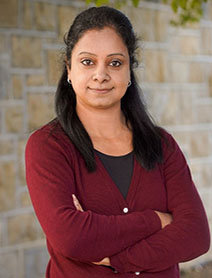About
Dr. Divya Srinivasan is the McQueen Quattlebaum Professor, holding joint appointments in Industrial Engineering and Bioengineering at Clemson. Broadly working in the domain of human factors, biomechanics, and ergonomics, her research is focused on assessing and improving human physical performance (with considerations to factors such as aging, gender, pain etc.), understanding and modeling human biomechanics and movement control, and studying human motor learning and skills training. She directs the Biomechanics, Ergonomics, Safety and Training (BEST) lab at Clemson. She received her Ph.D. in Biomedical Engineering from the University of Michigan Ann Arbor in 2010. As an EU Marie Curie Postdoctoral Fellow, she worked as a Research Scientist in Occupational and Public Health Sciences in Sweden, from 2010 to 2015. Prior to joining Clemson, she was Assistant and Associate Professor in Industrial and Systems Engineering at Virginia Tech, between 2015 and 2021. One of the major thrusts of her current research is focused on human-augmentation systems, specifically robotic exoskeletons. She is collaborating with researchers at Clemson University and in Prisma Health to explore the potential for exoskeletons to reduce the risk of musculoskeletal disorders among surgical and nursing staff, and EMS clinicians; and for evaluating the potential for novel rehabilitative exoskeletons to aid in gait retraining and assistance among specific clinical populations (e.g., spinal cord injury). Her research has been funded by several grants (> $20 millions, with a PI share of >$8 millions) from NSF, NIH, NIOSH, as well as by industry partners in manufacturing and logistics.
Visit Dr. Srinivasan's Department Profile.
How their research is transforming health care
One of the major thrusts of her current research is focused on human-augmentation systems, specifically robotic exoskeletons. She is collaborating with researchers at Clemson University and in Prisma Health to explore the potential for exoskeletons to reduce the risk of musculoskeletal disorders among surgical and nursing staff, and for evaluating the potential for novel rehabilitative exoskeletons to aid in gait retraining and assistance among specific clinical populations (e.g., spinal cord injury). She is also broadly interested in research related to physical ergonomics considerations for healthcare workers, and quantitative biomechanics assessments of training efficacy/novel training environments (e.g., those involving virtual reality and haptics) in rehabilitation and exercise training.
News and media related to their research
- Clemson News - One step at a time
- Clemson News - Divya Srinivasan and her team cement leadership in ergonomics research with multiple awards
- Clemson News - Clemson University’s STRIDE to channel research brilliance to real-world results
- Clemson News - Paralympics helps shine a light on exoskeleton research at Clemson University
- Clemson News - Exoskeletons could soon make the future of work healthier and safer for manual laborers
- Silicon Republic - Powered exoskeletons are the technology of the future
- Phys Org - Iron Man-like exoskeletons studied to improve productivity, safety, and well-being
- The Roanoke Star - VT research bridges gap between technology and farmers in the field
Health Research Expertise Keywords
Faculty Scholar, Biomechanics, human movement control, ergonomics, human-robot interactions, motor skills training

